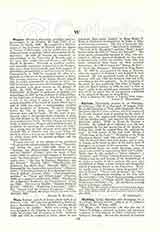

Wace, ROBERT, poet, b. at Jersey, about 1100; d. Bayeux, 1174. His maternal grandfather, Toustein, was a chamberlain to Duke Robert, and his family belonged to the nobility. When very young, as he was destined to the Church, he was sent to Caen to make his studies, and afterwards to Paris. Between 1130 and 1135 he returned to Caen, where he was appointed clerc lisant (reader) to King Henry I. Being in straitened circumstances, he began to write to increase his resources. The first of his works that have come down to us are: “The Life of St. Nicholas”; “The Life of St. Margaret”; and the “Brut” better known under the title of “Geste des Bretons”. The latter poem, presumably finished in 1155, was presented to Alienor, Queen of England; the two other works had been written for wealthy lords who had books translated from Latin for their personal instruction. In 1160 he began his “Roman du Rou”, or “Geste des Normanz”, dedicated to King Henry II. In 1162 he accompanied the king at Fecamp, when the remains of Richard I and Richard II were removed. He was appointed canon of Bayeux not between 1155 and 1160, but between 1160 and 1170, according to his own authority. At the beginning of his poem, he says positively that when he began to write the Rou’s history, in 1160, he was “a clerk of Caen”, while in the second part (certainly composed after 1170) he states that he was granted a prebend in the church of Bayeux by King Henry.
LOUIS N. DELAMARRE

